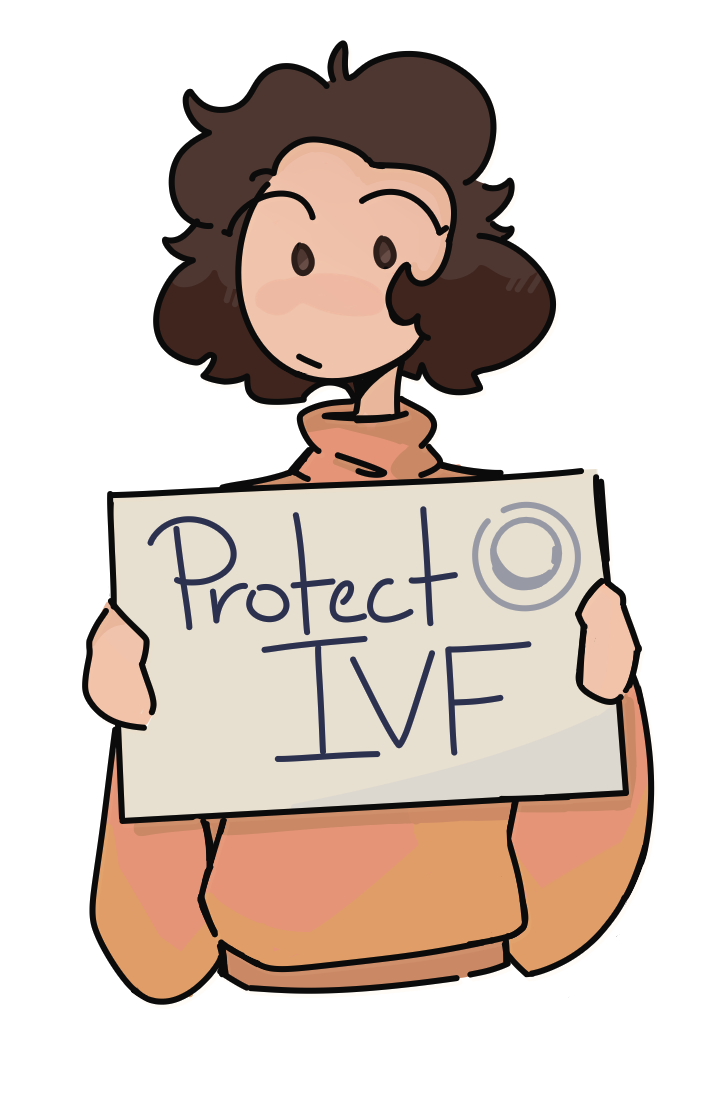After emigrating from China, my parents raised me to believe that I would thrive as a member of the “Land of the Free” in America. The magnificent, unalienable right of independence was supposed to bless us with the opportunity to achieve the “American Dream”— a vision of the freedom to pursue prosperity without interference. This dream was shaken in 2022 when the Supreme Court of the United States’ overturning of Roe v. Wade set a heavily restrictive precedent on reproductive healthcare. This precedent undermined Americans’ fundamental right to make safe and informed reproductive decisions.
Almost two years later, on Feb. 16, while reviewing a lawsuit concerning the destruction of embryos, the Supreme Court of Alabama ruled that embryos created through in-vitro fertilization should be considered children under Alabama law. To prevent civil and criminal liability, within the first week, in vitro fertilization (IVF), lab fertilized eggs, treatment was paused at two of eight fertility clinics in Alabama.
This policy poses a significant threat to the viability and success of IVF treatment in Alabama. Implanting a collected and fertilized mature egg in the uterus relies on maximizing egg quantity and conditions. On average, a mature embryo has a 10%–60% chance of successfully becoming a baby. The consideration of embryos as children opens up fertility clinics to legal repercussions, limiting embryo collection and implantation as a result. Not only does this policy undermine medical practices, but it also infringes upon patients’ reproductive rights by curbing their access to effective fertility treatments.
The issue of infertility affects one in five married women. In response, many of these women turn towards IVF to build a family. In 2021 alone, IVF contributed to approximately 2% of American births, resulting in the successful delivery of 86,146 infants through assisted reproductive technology
Policies that reclassify embryos as children directly impede access to effective treatment. Reproductive rights include the freedom to make informed decisions about one’s body and health, including the choice to pursue IVF. Such policies deny individuals their dreams of expanding their families.
The legality of fertility treatments has remained uncertain until the passing of the new Alabama State Senate law in March. This law granted civil and criminal immunity to IVF service providers and receivers if embryos were destroyed during medical services.
In the wake of these legal challenges, Mobile Infirmary Medical Center, a fertility treatment clinic involved in the original lawsuits involving the destruction of embryos, decided to discontinue IVF treatment after 2024. The Center for Reproductive Medicine also discontinued IVF treatment shortly after because of the significant challenges to IVF services and the storage of embryos.
Will failure to provide medical treatment to embryos result in charges of child neglect? Will the involvement of child protective services result in state control (or confiscation) of an individual’s “children?” If embryos count as children while extrauterine, what’s stopping the states from infringing upon intrauterine embryos?
As legal uncertainties and liabilities continue to intersect with the delivery of healthcare, patient care is sacrificed, and challenges to the fundamental principles of reproductive rights continue to rise. The role of religion within law and healthcare also comes into question.
“We believe that each human being from the moment of conception is made in the image of God created by him to reflect his likeness,” Alabama Chief Justice Tom Parker (concurring opinion) said. By invoking the Scripture from the Bible, Chief Justice Parker blurs the line between legality and spirituality. Not only does the declaration of embryos as children infringe on our freedom as Americans, but incorporating Christianity within legislation does as well. The weaving of Christianity within American infrastructure contradicts our First Amendment rights to freedom of religious liberty.
Across the U.S., an estimated 1.5 million embryos remain frozen. These embryos that are under attack are necessary to provide for LGBTQ+ community members, women struggling with endometriosis or PCOS, cancer patients, single/older parents, etc.
Already, 11 states declared fertilization as the beginning of personhood. The effectiveness of these policies is still up in the air.
Many U.S. senators, including Tammy Duckworth of Illinois, are pushing for constructive policies to re-establish Americans’ right to IVF. These acts include the Access to Family Building Act, which would establish IVF as a statutory right for all Americans. The impact of these Alabama laws extends nationally, setting dangerous precedents that can influence further restrictions on healthcare policies nationwide.
In this pivotal era, securing our liberty and accessibility to reproductive healthcare extends beyond legal battles within Alabama—it’s about preserving the essence of the American Dream for all those who seek to pursue it on their own terms.
This piece was originally published in Zephyrus’ print edition on April 18, 2024








